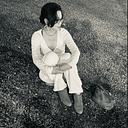Meet Me in Another Life — Book Review
I thought this was a romantic novel, so I bought it on Valentine’s day, because I haven’t read a good one for long — — — one with juxtaposed historical or natural background that makes you owed and awed and heart ached such as Ali and Nina or Visible world, and also makes you realize the insignificance yet precious value of human emotions in front of the great unknown.
One excepetion is the Netflix series Modern Love. It is real, not only because it comes from New York Times reader posts, but also I can relate to it, even if it’s in New York City. And yet, still too light-weighted. Ann Hathaway’s episode recommended. Because I used to be a bipolaric as well.
So what about Meet Me in Another Life?
It’s not a romantic novel. At all. It’s about friendships. Two people encounter each other in every life, until one day they found another very deja-vu. And both of them carry the memories of all the several previous lives. Sometimes they are mother and son, sometimes teacher and student, sometimes classmates, but just once, they were a couple.
When I read it, I realized there could be how so many forms of people interacting with each other. And yet when we talk about relationships, it’s inituitively so confined to just romantic ones.
They collaborated to fix the puzzle of who they were, why they kept bumping into each other at the same city, and dying almost in the same way they could decide.
At a life where both of them were astrophysicists, they thought perhaps, they are aliens astronauts landing on earth. At the astrophysics museum, they realized they were exactly the two people lying there. And one is dying, the spaceship crashed. Only one could survive.
The girl said she would sacrifice herself for the boy. So she jumped in. But the wrong button was pressed, she lived and the boy was gone.
That was the end of the story.
I wasn’t sad. I wans’t moved. I was just feeling curious about how the structure of the novel forshallows the scenarios. How they’d end up. When writing sci-fictions, I always felt there were that strong lack of isolation from human emotions, because perhaps explaining to the public audience how science works and convince them to keep on reading the reasonable plots are already quite a work. So I rarely find sci-fi attractive. Even works of Assimove or Ted Chiang barebly scratched my heart, or surprised me. I guess there would need to be a breaking scientific element that embeds in the plot, so that I could relate to it more, or picture it vividly when reading the novels, as I always do.
